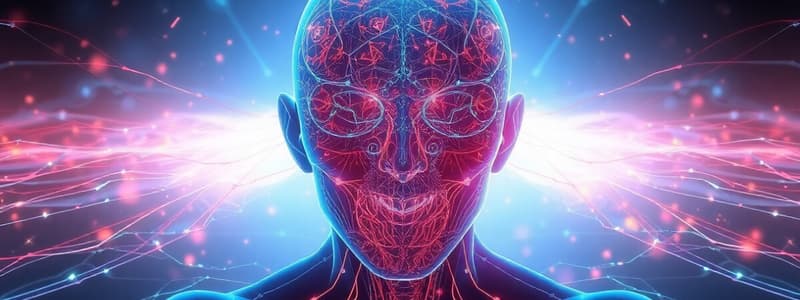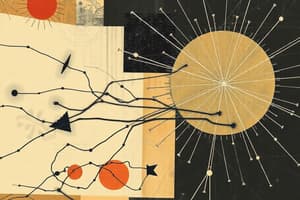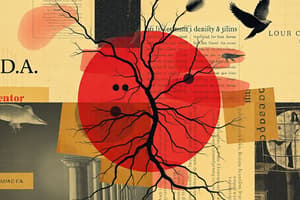Podcast
Questions and Answers
What condition is characterized by an inability to recognize stimuli from the senses?
What condition is characterized by an inability to recognize stimuli from the senses?
- Neglect syndrome
- Somatosensory loss
- Astereognosia
- Agnosia (correct)
Which process provides signals that trigger the sensation of pain?
Which process provides signals that trigger the sensation of pain?
- Nociception (correct)
- Transduction
- Hyperalgesia
- Allodynia
What is astereognosia specifically associated with?
What is astereognosia specifically associated with?
- Inability to identify objects by touch (correct)
- Complete sensory neglect of one side
- Inability to perceive temperature changes
- Inability to recognize sounds
Which type of nociceptor is activated by physical forces such as stabbing or stretching?
Which type of nociceptor is activated by physical forces such as stabbing or stretching?
What neurological condition involves the complete neglect of one side of the visual field?
What neurological condition involves the complete neglect of one side of the visual field?
What are the five key somatosensory sensations?
What are the five key somatosensory sensations?
Which type of receptors are primarily responsible for mechanosensation?
Which type of receptors are primarily responsible for mechanosensation?
Which of the following receptor types is specifically associated with light touch?
Which of the following receptor types is specifically associated with light touch?
What is one function of the skin in the somatosensory system?
What is one function of the skin in the somatosensory system?
Which of these mechanoreceptors is primarily responsive to vibrations and pressure?
Which of these mechanoreceptors is primarily responsive to vibrations and pressure?
Which layer of the skin is referred to as the outer layer?
Which layer of the skin is referred to as the outer layer?
What sensation is primarily associated with Ruffini's endings?
What sensation is primarily associated with Ruffini's endings?
Which receptor is NOT part of the somatosensory system?
Which receptor is NOT part of the somatosensory system?
What characteristic of mechanoreceptors allows them to detect fine touch?
What characteristic of mechanoreceptors allows them to detect fine touch?
Which best describes a large receptive field in mechanoreceptors?
Which best describes a large receptive field in mechanoreceptors?
What is the role of mechanosensitive ion channels in mechanoreceptors?
What is the role of mechanosensitive ion channels in mechanoreceptors?
How do adaptation rates differ among mechanoreceptors?
How do adaptation rates differ among mechanoreceptors?
Which of the following statements about mechanoreceptors is NOT true?
Which of the following statements about mechanoreceptors is NOT true?
What type of pressure detection is specifically advantageous for mechanoreceptors with varying adaptation rates?
What type of pressure detection is specifically advantageous for mechanoreceptors with varying adaptation rates?
What type of axons are responsible for mediating touch sensations in the somatosensory system?
What type of axons are responsible for mediating touch sensations in the somatosensory system?
Which type of ion channels in mechanoreceptors respond to mechanical force?
Which type of ion channels in mechanoreceptors respond to mechanical force?
What physiological response is triggered by mechanical stimuli in mechanoreceptors?
What physiological response is triggered by mechanical stimuli in mechanoreceptors?
Which of the following is a characteristic of mechanoreceptors?
Which of the following is a characteristic of mechanoreceptors?
What role do secondary messengers play in mechanoreception?
What role do secondary messengers play in mechanoreception?
What are dermatomes useful for?
What are dermatomes useful for?
What is the function of C fibers in the somatosensory system?
What is the function of C fibers in the somatosensory system?
Which component remains unidentified in most somatic sensory receptors?
Which component remains unidentified in most somatic sensory receptors?
How many spinal segments are associated with the spinal cord organization?
How many spinal segments are associated with the spinal cord organization?
What type of axon terminal do mechanoreceptors have?
What type of axon terminal do mechanoreceptors have?
What is the role of the first-order neuron in the ascending sensory pathways?
What is the role of the first-order neuron in the ascending sensory pathways?
How does the dorsal column-medial lemniscal pathway transmit input to the somatosensory cortex?
How does the dorsal column-medial lemniscal pathway transmit input to the somatosensory cortex?
Where are the cell bodies of the second-order neurons located in the ascending sensory pathways?
Where are the cell bodies of the second-order neurons located in the ascending sensory pathways?
What does the primary somatosensory cortex (S1) primarily process?
What does the primary somatosensory cortex (S1) primarily process?
Which of the following areas in the primary somatosensory cortex is responsible for processing texture?
Which of the following areas in the primary somatosensory cortex is responsible for processing texture?
In the context of neuroplasticity, what happens to somatotopic maps when digits are removed?
In the context of neuroplasticity, what happens to somatotopic maps when digits are removed?
How does the trigeminal touch pathway convey somatosensory information?
How does the trigeminal touch pathway convey somatosensory information?
What feature characterizes the representation of body parts in cortical maps?
What feature characterizes the representation of body parts in cortical maps?
What type of information does Area 3b of the primary somatosensory cortex specialize in?
What type of information does Area 3b of the primary somatosensory cortex specialize in?
Which types of pathways primarily involve interneurons?
Which types of pathways primarily involve interneurons?
Flashcards are hidden until you start studying
Study Notes
Somatosensory System
- The somatosensory system is responsible for touch, pain, temperature, pressure, and proprioception.
- It is not considered one of the special senses, but rather a system made up of receptors broadly distributed throughout the body that responds to many kinds of stimuli.
Touch Receptors
- Mechanoreceptors are the most common type of somatosensory receptor, responsible for touch sensations.
- Mechanoreceptors include:
- Pacinian corpuscles: respond to vibrations, both high and low frequency, and pressure.
- Ruffini's endings: respond to stretching and sliding.
- Meissner's corpuscles: respond to pressure, force, and fine touch.
- Merkel's disks: respond to light touch.
- Krause end bulbs: respond to temperature, but their role in temperature perception is not fully understood.
- Mechanosensitive ion channels convert mechanical force into changes in ionic current.
- Different ion channels can be sensitive to physical stretching of the lipid membrane or deformation of the cell's cytoskeleton.
Primary Afferent Axons
- Primary afferent axons of the somatosensory system are classified as Aa, Ab, Ad, and C axons.
- Ab axons mediate touch sensations, while C fibers mediate pain, temperature, and itch.
Spinal Cord Organization
- The spinal cord is divided into four sections: cervical (head/neck), thoracic (chest/abdomen), lumbar (lower abdomen/upper leg), and sacral (lower limbs).
- Spinal segments are organized into dermatomes, which are areas of skin where sensory information is relayed to a specific spinal segment nerve.
Ascending Somatosensory Pathways
- Sensory information travels up the spinal cord via a chain of three neurons.
- First-order neuron: conducts impulses from receptors to the spinal cord or medulla. It synapses with the second-order neuron.
- Second-order neuron: an interneuron located in the dorsal horn of the spinal cord or medullary nuclei. Its axon extends to the thalamus or cerebellum.
- Third-order neuron: also an interneuron, located in the thalamus. Its axon extends to the somatosensory cortex.
Dorsal Column-Medial Lemniscus Pathway (DCML)
- The DCML pathway transmits information about discriminative touch, vibrations, pressure, and proprioception to the somatosensory cortex.
- It decussates (crosses over) at the medulla oblongata.
Trigeminal Touch Pathway
- The trigeminal touch pathway conveys somatosensory information from the face.
- This pathway also carries information from the dura mater.
- It decussates at the level of entry of the trigeminal nerve (cranial nerve V) at the trigeminal nuclei in the brainstem.
Somatic Sensory Areas of Cortex
- The primary somatosensory cortex (S1) is located in Brodmann areas 1, 2, and 3.
- Area 3a: proprioception
- Area 3b: basic touch sensations
- Area 1: texture
- Area 2: shape and size; also contributes to proprioception
Cortical Somatotopy
- The somatosensory cortex has a map called the homunculus that represents the body disproportionately, reflecting the different sensitivities of various body parts.
- The homunculus demonstrates that areas with more receptors, like the hands and face, have larger cortical representations.
Somatotopy in Other Animals
- Other animals, like cats and mice with whiskers, have somatotopic maps in their cortex as well.
- Some animals, such as owl monkeys, have somatotopic maps in more than one cortical region.
Somatotopic Map Plasticity
- Somatotopic maps can adjust to changes, like amputation, to prevent "wasted" brain space.
- If digits are removed or overstimulated, the somatotopic map will change, demonstrating neuroplasticity.
Posterior Parietal Cortex
- The posterior parietal cortex is involved in integrating somatic sensation with visual stimuli, movement planning, and attention.
- Damage to the posterior parietal cortex can cause neurological disorders such as:
- Agnosia: inability to recognize stimuli from senses
- Astereognosia: inability to identify objects by feel
- Neglect syndrome: one side of the body or sensory space is neglected.
Pain
- Pain is a feeling of soreness, aching, or throbbing. Nociception is the sensory process that triggers pain.
- Nociceptors are the receptors for pain.
- Nociceptors are typically polymodal, meaning they can be stimulated by multiple types of stimuli, including:
- Strong mechanical stimulation
- Temperature extremes
- Oxygen deprivation
- Chemicals
Nociception
- Damaged cells release substances that can activate nociceptors such as:
- Proteases (which activate bradykinin), ATP, potassium ions
- Histamine
Types of Nociceptors
- There are three types of nociceptors based on their stimulus:
- Mechanical: respond to physical forces like stabbing, punching, or stretching.
- Thermal: respond to hot and cold temperatures.
- Chemical: respond to pH changes or specific ligands.
Studying That Suits You
Use AI to generate personalized quizzes and flashcards to suit your learning preferences.




